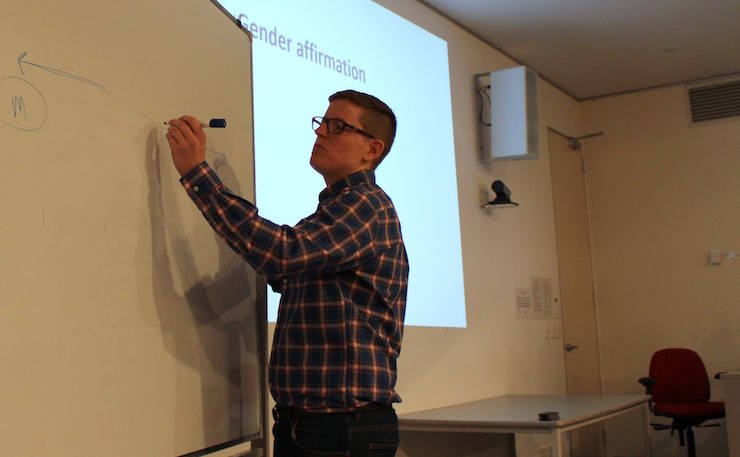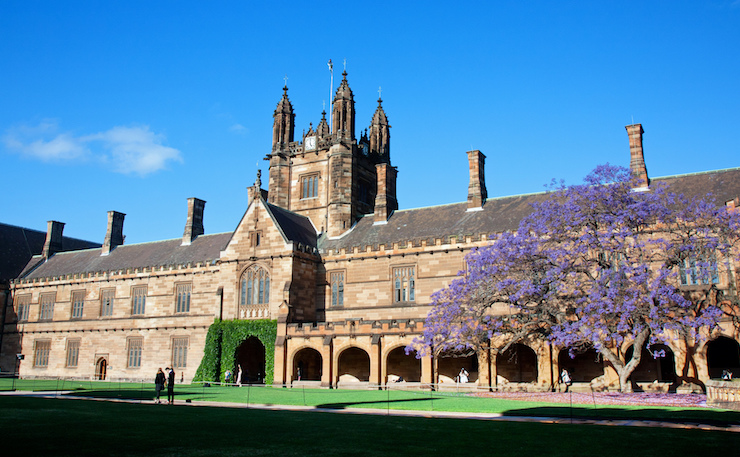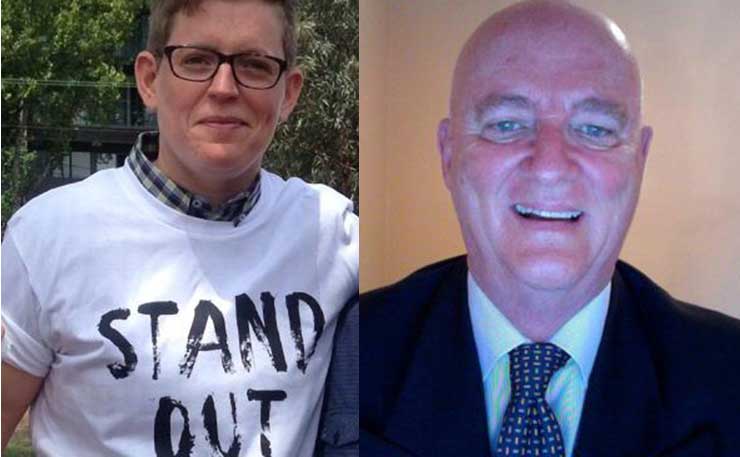There’s no hypocrisy in the Left’s defence of Roz Ward and opposition to Barry Spurr, writes Nick Riemer. The principle has nothing to do with freedom of speech, and everything to do with why we have universities in the first place.
“When for any reason… the administrator of [a university]attempts to dislodge a professor because of his political or religious sentiments, at that moment the institution has ceased to be a university”.
So affirmed the University of Chicago’s first president in 1892. Going on recent experience, it would seem that Australian Vice-Chancellors are pretty sanguine about their institutions not being universities any more.
Following the 2014 Barry Spurr email scandal and 2015 Richard Kemp affair (in which I was involved), the Roz Ward controversy has once again required a university to adjudicate on the relation between academic work, the varied commitments and motivations of the people who do it, and the necessarily political context in which it is applied.
The course initially taken by La Trobe Vice-Chancellor John Dewar – suspending Ward – was met with intense opposition. Support for Ward was mostly framed in terms of freedom of expression and its campus version, academic freedom.
But this frame isn’t adequate: it’s not free speech, but universities’ overall purpose, which provides the grounds for opposing attempts to remove people like Ward .
The hypocrisy of the Left?
Unsurprisingly, Ward’s short-lived suspension from La Trobe seems to have divided observers on broadly political lines, progressives in favour of the Safe Schools programme opposing the suspension, and conservatives opposed to the programme supporting it.
Some commentators, however, claimed to detect an inconsistency in the support that was lavished on Ward from so many quarters. Isn’t it odd, they asked, that the people who raced to defend Ward had nothing to say in 2014, when Sydney University’s Barry Spurr’s private emails caused a national scandal?
Not only did the people now supporting Ward leave their free speech placards in the cupboard, they sometimes even joined the calls for his dismissal.
Spurr’s emails, generously leaked to New Matilda in 2014 by an anonymous benefactor, revealed the special consultant to the government’s national curriculum review expressing virulently racist and sexist views.
Spurr became the object of general condemnation and resigned from his personal chair in Poetry and Poetics.
If, as so many observers have stated, Ward should be supported on freedom of speech grounds, what possible justification could there be for defending her, but not Spurr?
Doesn’t the contrast show up the Left’s hypocrisy? Triumph freedom of expression and respect of privacy when you agree; when you don’t, pretend they don’t exist.

Matthew Lesh, from the searingly right-wing Institute for Public Affairs, certainly can’t be accused of any such incoherence. Lesh made no secret of his political differences to Ward, but defended her right to stay in her job regardless of her political leanings.
Fortunately for progressives, the belief that Ward should be defended and Spurr opposed can be consistently held – just on different grounds from those of free speech.
As Stanley Fish noted years ago, universities don’t, and shouldn’t, respect the principle of absolute freedom of speech, for either students or staff.
Speech in universities is subject to substantial restrictions. Unconditional support for free speech would be inconsistent with universities’ educational role, a role that intrinsically consists in promoting some types of expression (essays judged as good, for instance) and repressing others (ones judged as bad).
Just as students don’t enjoy free speech, staff don’t either: a university could, for instance, justifiably suspend an academic who consistently substituted a discussion of the weekend’s sporting results for the lecture-series on cell pathology they were timetabled to deliver, if they were unable to demonstrate why sporting results were actually relevant to the cell pathology curriculum.
Not free speech, but university independence
Rather than free speech, the principle Ward’s supporters should appeal to is university independence. This is often mistakenly run together with freedom of expression (academic freedom), but the two need to be kept distinct.
Freedom of speech – the freedom to express ideas without censorship, restraint or punishment – applies to individuals. University independence – the right for universities to make their own decisions about how they are run, without interference from outside – applies to institutions.
University independence can be described as “academic freedom” only if we understand this as “the freedom of the academy”, not as “academics’ freedom” – as institutional freedom from external interference, and not the absolute individual freedom of academics to say anything they want.
Defending university independence or academic freedom in the institutional sense doesn’t require you to defend freedom of expression in the individual one.
The reason why is obvious. The university’s function of pursuing and democratizing knowledge intrinsically engenders constraints: that’s why it’s uncontroversial that an academic’s freedom of expression is limited so as to oblige them to lecture on the subject they are supposed to lecture on.
Similarly, it’s a universally accepted norm that academics shouldn’t insult or verbally attack students. These restrictions on academics’ freedom of speech are so taken for granted that they’re easily forgotten.
That doesn’t make them any less real: academics’ freedom of speech is, and long has been, limited in at least these ways. That means that freedom of speech can’t be appealed to defend Ward or Spurr: academics are entitled to no such absolute freedom.

So people who want to defend cases like Ward but oppose ones like Spurr need a principled reason to justify distinguishing between those kinds of speech they think should be free and those they think shouldn’t.
Constraints on what can be said aren’t the only ones to which university staff are subject. Another central constraint deriving from universities’ role of pursuing and democratizing knowledge mandates that, like public servants, judges or doctors, academics should discharge their duties dispassionately and without prejudice.
No discrimination should get in the way of teaching or research. In contrast to Ward, who didn’t demonstrate prejudice against anyone, this was the grounds on which Spurr’s comments demonstrated his unsuitability to work in a university.
They gave evidence of a level of prejudice towards certain kinds of people (Aboriginal people, dark-skinned people, Chinese people, women) that called into question his ability to treat students fairly: how could an Aboriginal student, for example, possibly have confidence in the fairness of someone who consistently described Aboriginal people in the terms Spurr used (“human rubbish tips”)?
This lets us see why it’s consistent to defend Ward and oppose Spurr: Ward’s speech certainly offended some people, but it offered no evidence of her unsuitability to fulfil her academic function. Spurr’s, in suggesting the presence of a high level of prejudice against certain minorities, did.
Collegial heresies
How should a university decide that a staff member’s speech or actions aren’t compatible with its overall purpose? Not, as was the case with Ward, autocratically through university managers and on non-academic grounds (“undermining public confidence in the Safe Schools program”), but collegially, by giving academics the time to discuss and collectively self-moderate their activity, according to properly academic criteria.
This is no more than the traditional model of collegial self-governance, decayed to the point of non-existence in contemporary Australian (and British) universities.
Only this kind of collegial, academically-grounded self-moderation is in a position to respect the autonomy and purposes of higher education.
In this light, what distinguishes Ward’s suspension from the Spurr case was that it wasn’t motivated by any internal academic criteria, but by political pressure brought to bear on the university from outside it, to which the university’s leadership cravenly succumbed.
Spurr, in contrast, hadn’t been the object of any kind of public agitation before the email scandal broke; while this aroused an enormous amount of public discussion, he was suspended almost as soon as the emails were revealed, without a campaign against him like the one to which Ward was subject.
Spurr was, indeed, defended by the very people now attacking Ward.
This difference is crucial. Whether politicians, or anyone else, find an academic’s professional activity objectionable – or, for that matter, praiseworthy – is strictly irrelevant to the academic merit of their ideas.
Universities should be free of political interference for the same reason hospitals should be: this is the only way they can properly do their work.
Academics can’t look to politicians to tell them the ‘right’ answers in their fields of enquiry because politicians don’t know what they are. Academics have to find them out for themselves, in conformity with the procedures and criteria of their discipline.
This obviously doesn’t mean that the conclusions reached in any one discipline at any one time are correct. The ideas behind the Safe Schools programme are a case in point: just like any other research in the human and social sciences, they may or may not be right, and they shouldn’t be presented as factual if they are, in fact, just conjectures, best guesses, or even compelling interpretations.
But this doesn’t affect the point that it’s researchers, not politicians, who are in the only authoritative position to judge. Denying this amounts to denying the existence of academic expertise

The same principle of political non-interference in academia entails that universities not stack their councils with business leaders determined to render university decision-making more ‘entrepreneurial’: they, too, are a powerful political lobby, institutionalized in the way universities are now run, and equally perverting with respect to the core activities of teaching and research. Bankers and miners don’t know what the right answers are, either. Only other researchers can judge the merits of their peers’ work, and even then, opinions differ widely, as anyone used to peer-review knows.
Teaching and research are human, living activities, and their nature is always changing. This means the academic standards to which staff are subject must themselves be understood as always up for renegotiation, and academics must be free to determine for themselves what counts as the appropriate content to teach or research.
Heresy and dissent have a regular habit of being subsequently proven right. So it’s only by protecting the dissenters and heretics that the possibilities of intellectual and social progress can be kept open.
Intellectual life is richest when it’s most pluralistic. Spurr’s views on literature were heavily contested and unpopular, but he had propounded them, in the department to which I belong, for many years without anyone challenging his freedom to do so.
Collegial heresy is the right model for the advancement of learning.
Ward’s critics, by contrast, weren’t willing to show her any such indulgence. Their ire was aroused exactly by the content of her work and its claimed social consequences.
The pretext for her suspension – a leaked Facebook post, expressing views on the flag that had already been officially aired at La Trobe – was just that: a pretext.
It was the Safe Schools programme itself, which the Victorian opposition has now promised to axe, which was at the root of the Right’s objections. But as long as an academic’s work meets (open and evolving) internal academic standards, their ongoing employment shouldn’t be conditional on the political acceptability of their conclusions.
If political acceptability becomes the standard, then we find ourselves saddled with state-mandated scholarly travesties like Lysenkoism.
The divine right of VCs
The principle of non-interference in academic work also applies within universities themselves. As Ward’s experience and many others’ illustrates, the results of research are not just inconvenient to politicians; they’re often inconvenient to university authorities themselves.
That’s simply the price of valuable work. The concentration of power in unaccountable managers in Australian universities directly works against this by creating an environment of fear and compliance. In order for research and teaching to be conducted freely, neither the Vice-Chancellor nor any other official should have the power to meddle in academics’ work by suspending or dismissing them.
None of this excludes that, in highly exceptional circumstances, it may become necessary for universities to exclude this or that academic. But because universities should be democratic, any such decisions should be taken collegially, by vote of staff, rather than justified, as is the case today, through the divine right of VCs or other managerial supremos.

People whose concern is knowledge have an obligation to democratize it. Not, as the impoverished contemporary doxa has it, because doing so delivers more skilled graduates to employers, but because spreading knowledge as widely as possible enables intellectual growth for the greatest number of people and thereby promotes maximal social flourishing.
This can’t happen if knowledge is continually at risk of confiscation by powerful interest groups, as is regularly the case both in Australia and abroad.
The attempt to gag Ward was a blatant attempt to confiscate knowledge through political censorship. As such, it was an attack both on universities’ purpose, and on their independence, and rightly opposed by the Left.
By the same token, opposition to Spurr’s ongoing tenure was justifiable on the grounds that knowledge can’t be democratized by someone who refers to Aboriginal people as “darkies”, Chinese people as “chinky-poos”, and overweight people as “fatsoes” or “fatties”.
The grounds for believing Ward is fit to work in a university are exactly consistent with the ones for believing Spurr was not. These have nothing to do with freedom of speech, and everything to do with the independence and lack of bias that academics need in order to be able to research and teach in a way that serves universities’ proper function.
Donate To New Matilda
New Matilda is a small, independent media outlet. We survive through reader contributions, and never losing a lawsuit. If you got something from this article, giving something back helps us to continue speaking truth to power. Every little bit counts.





